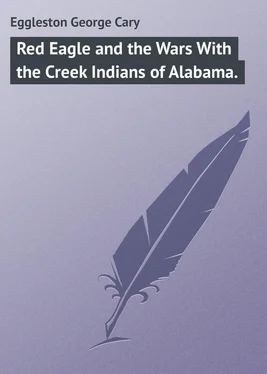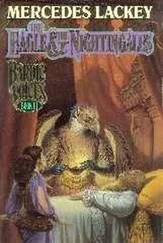George Eggleston - Red Eagle and the Wars With the Creek Indians of Alabama.
Здесь есть возможность читать онлайн «George Eggleston - Red Eagle and the Wars With the Creek Indians of Alabama.» — ознакомительный отрывок электронной книги совершенно бесплатно, а после прочтения отрывка купить полную версию. В некоторых случаях можно слушать аудио, скачать через торрент в формате fb2 и присутствует краткое содержание. Жанр: foreign_prose, на английском языке. Описание произведения, (предисловие) а так же отзывы посетителей доступны на портале библиотеки ЛибКат.
- Название:Red Eagle and the Wars With the Creek Indians of Alabama.
- Автор:
- Жанр:
- Год:неизвестен
- ISBN:нет данных
- Рейтинг книги:4 / 5. Голосов: 1
-
Избранное:Добавить в избранное
- Отзывы:
-
Ваша оценка:
- 80
- 1
- 2
- 3
- 4
- 5
Red Eagle and the Wars With the Creek Indians of Alabama.: краткое содержание, описание и аннотация
Предлагаем к чтению аннотацию, описание, краткое содержание или предисловие (зависит от того, что написал сам автор книги «Red Eagle and the Wars With the Creek Indians of Alabama.»). Если вы не нашли необходимую информацию о книге — напишите в комментариях, мы постараемся отыскать её.
Red Eagle and the Wars With the Creek Indians of Alabama. — читать онлайн ознакомительный отрывок
Ниже представлен текст книги, разбитый по страницам. Система сохранения места последней прочитанной страницы, позволяет с удобством читать онлайн бесплатно книгу «Red Eagle and the Wars With the Creek Indians of Alabama.», без необходимости каждый раз заново искать на чём Вы остановились. Поставьте закладку, и сможете в любой момент перейти на страницу, на которой закончили чтение.
Интервал:
Закладка:
A friendly half-breed, McNac by name, was driven from his home by one of the petty marauding parties spoken of a few pages back, and his cattle were carried to Pensacola by the marauders, and sold. After hiding in the swamps for some time, McNac at last ventured out at night to visit his home and see precisely what damage had been done. He was unlucky enough to meet High Head Jim at the head of a party of hostile Indians, and as there was no chance of safety either in flight or fight, McNac resorted to diplomacy, which in this case, as in many others, meant vigorous lying. He declared that he had abandoned his peaceful proclivities, and had made up his mind to join the war party. McNac appears to have had something like a genius for lying, as he succeeded in imposing his fabrications upon High Head Jim, who, suspicious and treacherous as he was, believed McNac implicitly, and confided to him the plan of the hostile Creeks. This plan was to kill Big Warrior, Captain Isaacs, McIntosh, Mad Dragon's Son, and the other friendly chiefs, before going finally upon the war-path, and, having thus deprived the friendly Creeks of their leaders, to compel them to join in the war upon the Americans. Then, High Head Jim said, the war would begin by simultaneous attacks upon the various settlements. Having exterminated the whites upon their borders, they were to march in three columns against the people of Tennessee, Georgia, and Mississippi, receiving assistance from the Choctaws and the Cherokees.
McNac bore this information at once to the intended victims, and thus enabled them to secure their safety in various ways; but the civil war increased in its fury. The hostile bands still confined themselves as yet chiefly to attacks upon the peaceful members of their own nation, destroying their houses, killing or driving off their cattle, and stealing whatever portable property they possessed.
Colonel Hawkins still hoped for peace, rather unreasonably, it must be confessed, and avoided interference as far as possible; but he extended protection to Big Warrior, and with the assistance of a force of friendly Creeks rescued that chieftain and escorted him to a place of safety.
In such a state of affairs, of course, a collision between the whites and the Indians was inevitable, and when it came, as will be related in the next chapter, the Creek war of 1813 was begun.
CHAPTER VI.
THE BATTLE OF BURNT CORN
In the month of July, 1813, Peter McQueen, High Head Jim, and the Prophet Francis, having collected a large amount of plunder in their descents upon the homes of peaceful Indians and the plantations of half-breeds, sought a market for their booty. Collecting their followers to the number of about three hundred men, they loaded a number of pack-horses, and set out for Pensacola, driving a herd of stolen cattle before them. It was their purpose to exchange these things at Pensacola for arms, ammunition, whiskey, and whatever else they wanted; and combining pleasure with business, they amused themselves on the route by burning villages and committing murders upon Indians who persisted in their friendship for the whites.
Meantime the white people had at last become thoroughly alarmed. The news which McNac brought of his conversation with High Head Jim convinced even the most sceptical that a war of greater or smaller proportions was at hand, and it was the conviction of the wisest men among them that the best way to save themselves from impending destruction was to strike in time. The British had now begun seriously to threaten a descent upon the south-west, and it seemed to be more than probable that the savages were only delaying their general outbreak until their allies the British should appear somewhere upon the coast, and force the militia of the Tensaw and Tombigbee settlements to march away to meet them. Then the country would be defenceless, and the Indians could easily exterminate all that remained of the white population.
The pioneers who lived in that part of the country were brave, hardy, and resolute men, and they no sooner saw their danger distinctly than they took up arms with which to defend themselves. They resolved to assert their resolution by attacking not the Indian towns, but the roving parties of Indian outlaws who were bringing the war about. If they could crush these, punishing them effectually, they thought, the great body of the Creeks would think twice before deciding to make the contemplated war.
Accordingly a summons was sent out for volunteers. About two hundred men, or nearly that number, some of them white men, some half-breeds, and some friendly Indians, promptly answered the call. Among them was Captain Samuel Dale, better known in history as Sam Dale, the hero of the canoe fight, one of the strangest and most desperate affairs of the war, some account of which will be given in its proper place.
This little army was commanded by Colonel Caller, assisted by one lieutenant-colonel, four majors, and more captains and lieutenants than have been counted. Deducting these from the total force, we are led to the conviction that there must have been an average of about one officer to every two men; but even this enormous proportion of officers did not prevent the men from behaving badly in the presence of the enemy and getting sharply beaten, as will be related presently.
When the several companies composing this expedition were brought together, the line of march was taken toward Pensacola, with the purpose of encountering Peter McQueen and his force on their return. On the morning of July 27th, 1813, the advance scouts came in and reported that McQueen's force was encamped upon Burnt Corn Creek, just in advance of Caller's column, and that officer promptly determined to attack them.
Forming his men in line he advanced cautiously through the reeds until the Indian camp lay just below. Then, with a yell, the men dashed forward to the charge, and after a few moments' resistance the surprised and beaten Indians abandoned their camp with its horses and its rich stores of ammunition and food, and fled precipitately to the creek, by which the camp was encircled except upon the side from which the white men came. Dale, who was a born Indian fighter, Captain Dixon Bailey, and Captain Smoot – who were also resolute men and good officers, Bailey being an educated half-breed – saw at a glance that to pursue the flying savages was to crush them utterly; and they therefore led their men, some seventy-five or eighty in number, forward, and crowded the Indians as closely as possible. Had they been promptly supported, McQueen's force would have been utterly destroyed, and there might have been no Creek war for us to write and read about. Unluckily the other officers were less wise than Dale and Bailey and Smoot. When the Indians gave way and ran, leaving their camp with its pack-horses loaded with goods, the officers and men of the main body supposed that their work was done. Instead of joining in the pursuit, they broke their ranks, threw down their arms, and busied themselves securing the plunder.
Peter McQueen was a shrewd fellow in his way, and he was not long in discovering the weakness of the force which had followed him to the creek. Rallying his men he gave them battle, and began pressing them back. Colonel Caller, who was leading the advance, instead of ordering his main body to the front, as a more experienced officer would have done, determined to fall back upon them as a reserve. Dale, Smoot, and Bailey could have maintained their position while waiting for the reinforcements to come up, but when ordered to fall back upon the main body, their brave but untrained and inexperienced men retreated rather hastily. The men of the main body, having broken ranks to plunder, were in no condition to resist panic, and seeing the advance companies retreating, with the yelling Indians at their heels, they fled precipitately. Caller, Dale, Bailey, and Smoot tried to rally them, but succeeded only in getting eighty men into line. This small force, commanded by their brave officers, made a desperate stand, and brought the advancing savages to a halt. Dale was severely wounded, but he fought on in spite of his suffering and his weakness. Finally, seeing that they were overmatched and that their comrades had abandoned them to their fate, the little band retreated, fighting as they went, until at last the Indians abandoned the pursuit. Some of the Americans went home, others became lost and were found, nearly dead with fatigue and starvation, about a fortnight later.
Читать дальшеИнтервал:
Закладка:
Похожие книги на «Red Eagle and the Wars With the Creek Indians of Alabama.»
Представляем Вашему вниманию похожие книги на «Red Eagle and the Wars With the Creek Indians of Alabama.» списком для выбора. Мы отобрали схожую по названию и смыслу литературу в надежде предоставить читателям больше вариантов отыскать новые, интересные, ещё непрочитанные произведения.
Обсуждение, отзывы о книге «Red Eagle and the Wars With the Creek Indians of Alabama.» и просто собственные мнения читателей. Оставьте ваши комментарии, напишите, что Вы думаете о произведении, его смысле или главных героях. Укажите что конкретно понравилось, а что нет, и почему Вы так считаете.












